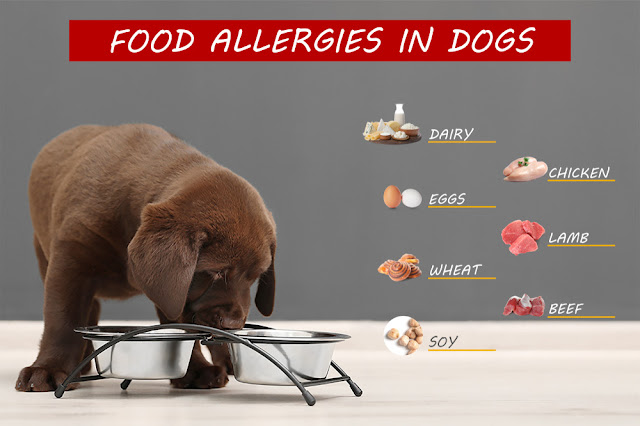Allergies in dogs are uncommon but can occur at any age. Allergies can cause significant issues for both the dog and its owner, and in severe cases, they can affect the dog’s life. To learn more about this condition, please refer to the following information!
1. Causes of Allergies in Dogs
Similar to humans, dogs can develop allergies when their immune system is weakened or when exposed to strong allergens from their environment. Allergies can be triggered by:
- Food: Allergens in food or food contaminated with mold.
- Environmental Factors: Plants, pollen, dust, weather, chemicals, medications, or venom from snake bites.
- Insects: Fleas, mites, bees, etc.
- Parasites: Mange, fungi, etc.
2. Common Types of Allergies in Dogs
2.1. Weather Allergies Weather allergies are relatively rare and usually occur in extreme cold or excessively humid conditions. Ensure your dog stays warm and the environment is adequately ventilated and dry if it's overly damp.
2.2. Food Allergies This is the most common type of allergy. It occurs when dogs consume unfamiliar food or food containing mold. While many assume that only poor-quality food causes allergies, dogs can be allergic to both expensive and cheap food. A compromised gut lining can lead to higher permeability and result in allergies.
2.3. Allergies to Soap and Shampoo Sometimes, the ingredients in shampoos can cause itching in your dog. The pH balance of a dog's skin is complex and acts as a protective barrier against irritants. Certain shampoo or soap ingredients can disrupt this natural barrier, leading to an allergic reaction. This typically happens if you use products not specifically designed for dogs. Specialized dog shampoos are less likely to cause such issues.
2.4. Allergies to Perfume and Pollen If your dog is allergic to pollen, it may be exposed to it on the skin or inhale it. Due to the complexity of this situation, along with the dog's health condition, it’s best to consult a veterinarian for a specific treatment plan. Treatment often includes both oral detoxifying medications and topical treatments.
3. Symptoms of Allergies in Dogs
Allergies in dogs can present suddenly with various unusual signs, including:
- Skin: Red, itchy rashes, dampness, and scaling.
- Eyes: Itching and tearing.
- Tail: Persistent itching, with the dog often biting the tail to relieve discomfort.
- Ears: Itching and signs of poor hygiene.
- Legs and Face: Swelling.
- Digestive Issues: Continuous sneezing, vomiting, diarrhea, and frequent licking of affected areas.
Most dog breeds will experience allergies at least once in their lifetime. However, certain breeds such as Bull Terriers, Setters, Retrievers, Pugs, Bulldogs, and Boston Terriers are more prone to allergies.
4. Home Remedies for Allergies in Dogs
- Identify and Remove the Allergen: Determine the cause of the allergy and remove it from the dog’s environment.
- Medication: Have some over-the-counter oral or topical medications prescribed by a vet for immediate use in case of allergic reactions.
- Alternative Bathing Products: Stop using current shampoos or soaps and switch to natural alternatives like green tea or guava leaf infusions for bathing.
- Food Management: Carefully check the ingredients in dog food and opt for hypoallergenic formulas, typically found in specially formulated dog food. Additionally, supplementing with beneficial bacteria and vitamin B can support gut health and repair intestinal epithelial cells.
5. Conclusion
This guide provides essential information about allergies in dogs. We hope this helps you effectively treat and manage allergies in your furry friend. Always ensure the best care for your pet!4o mini



